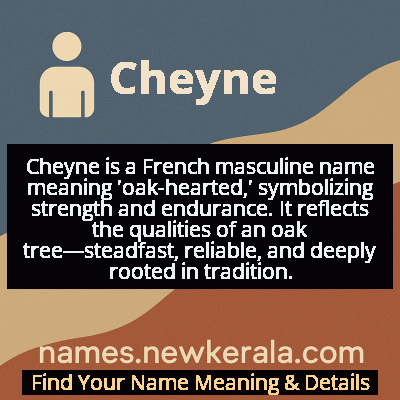Cheyne Name Meaning & Details
Origin, Popularity, Numerology Analysis & Name Meaning of Cheyne
Discover the origin, meaning, and cultural significance of the name CHEYNE. Delve into its historical roots and explore the lasting impact it has had on communities and traditions.
Name
Cheyne
Gender
Male
Origin
French
Lucky Number
6
Meaning of the Name - Cheyne
Cheyne is a French masculine name meaning 'oak-hearted,' symbolizing strength and endurance. It reflects the qualities of an oak tree—steadfast, reliable, and deeply rooted in tradition.
Cheyne - Complete Numerology Analysis
Your Numerology Number
Based on Pythagorean Numerology System
Ruling Planet
Venus
Positive Nature
Harmonious, responsible, caring, and artistic.
Negative Traits
Overly idealistic, superficial, possessive, or jealous.
Lucky Colours
Pink, turquoise.
Lucky Days
Friday.
Lucky Stones
Diamond, turquoise.
Harmony Numbers
2, 3, 9.
Best Suited Professions
Artists, musicians, teachers, healthcare workers.
What People Like About You
Warmth, nurturing nature, artistic flair.
Famous People Named Cheyne
Cheyne de la Girardière
French explorer
Early French colonist and explorer in North America
Cheyne Walk Resident
Historical figure
Named after the prestigious Cheyne Walk in Chelsea, London, home to many notable figures
Cheyne Stokes
Physician
Namesake for Cheyne-Stokes respiration, a breathing pattern he documented
Cheyne of Leuchars
Scottish noble
Early Scottish noble who gave his name to various locations in Fife
Name Variations & International Equivalents
Click on blue names to explore their detailed meanings. Gray names with will be available soon.
Cultural & Historical Significance
The cultural significance extends beyond family names to geographical locations, most notably Cheyne Walk in Chelsea, London, which became famous as a residence for artists, writers, and intellectuals during the 19th and 20th centuries. This association with creative and influential figures added a layer of artistic and intellectual prestige to the name. In Scottish history, various locations including Cheyne Court and Cheyne Hill preserve the legacy of the original Cheyne families, connecting the name to specific regional histories and land ownership traditions that spanned centuries.
Extended Personality Analysis
Individuals named Cheyne are typically perceived as strong-willed, reliable, and deeply principled people who embody the 'oak-hearted' quality of their name's meaning. They tend to be steadfast in their commitments and values, often serving as pillars of strength within their families and communities. These individuals usually possess a quiet confidence and natural leadership ability, preferring to lead through example rather than loud proclamation. Their decision-making is typically deliberate and well-considered, reflecting the enduring nature of the oak tree symbolism.
While they may appear reserved initially, those named Cheyne often reveal a warm, protective nature toward loved ones and demonstrate remarkable resilience in facing life's challenges. They typically value tradition and stability but are not resistant to change when it aligns with their core principles. Their strength of character often makes them excellent problem-solvers and trusted advisors. The combination of French elegance and oak-like durability in the name's heritage suggests a personality that balances refinement with rugged dependability—someone who can navigate sophisticated social situations while remaining grounded and authentic in their relationships and endeavors.
Modern Usage & Popularity
In contemporary times, Cheyne remains a relatively uncommon but distinguished given name, primarily used in English-speaking countries with French or Scottish heritage connections. While it never reached mainstream popularity, it maintains a steady presence as a sophisticated choice for parents seeking a name with historical depth and strong symbolism. The name has seen occasional use in the United States, United Kingdom, and Commonwealth countries, often favored by families with French or Scottish ancestry. Recent decades have shown a slight increase in usage as parents increasingly seek unique names with meaningful historical and natural connections, though it remains outside the top 1000 names in most English-speaking countries. The name's rarity contributes to its appeal for those wanting a distinctive yet classic-sounding name with rich cultural heritage.
Symbolic & Spiritual Meanings
Symbolically, Cheyne represents strength, endurance, and deep-rooted stability, drawing directly from its oak tree etymology. The oak has long been a symbol of wisdom, protection, and longevity in European cultures, making the name emblematic of these qualities. In metaphorical terms, Cheyne suggests a person who provides shelter and support to others, much like an oak tree offers protection and shade. The name also carries connotations of nobility and heritage, reflecting the historical use of oak imagery in heraldry and family crests. Additionally, it symbolizes resilience—the ability to withstand adversity while maintaining one's core values and integrity. The oak's association with Zeus/Jupiter in classical mythology adds layers of divine protection and authority to the name's symbolic meaning, while its connection to druidic traditions suggests wisdom and connection to natural cycles.

